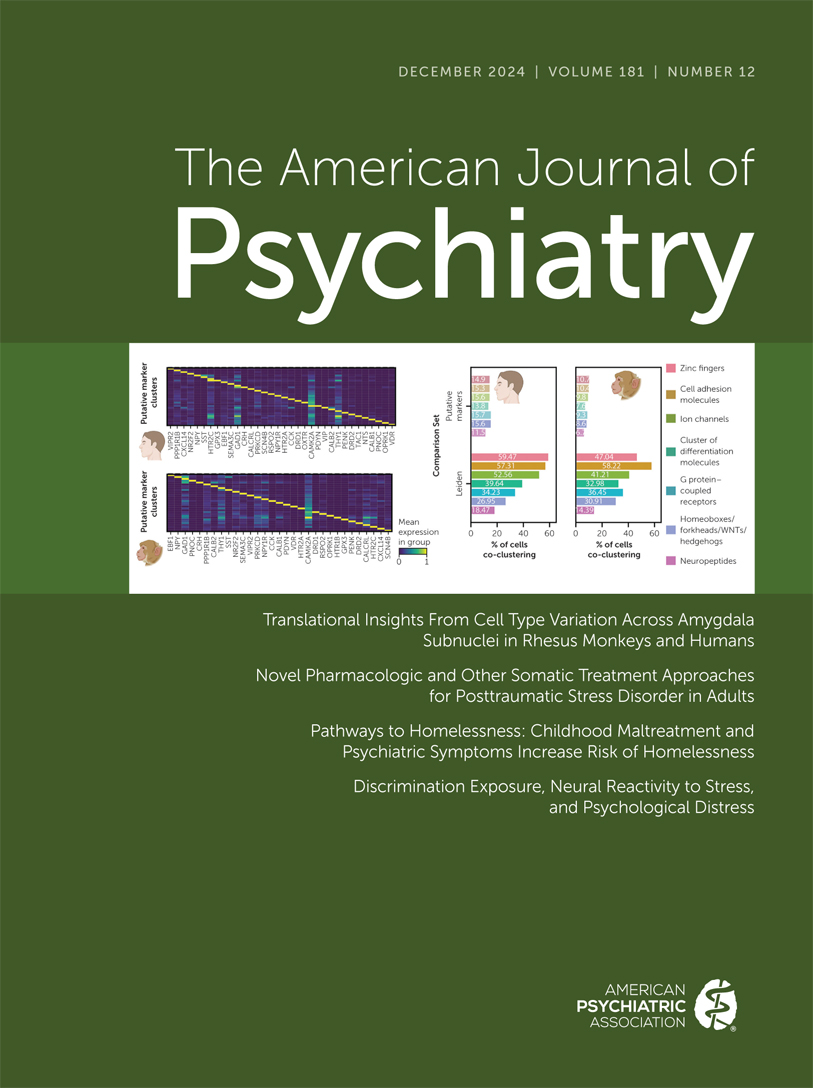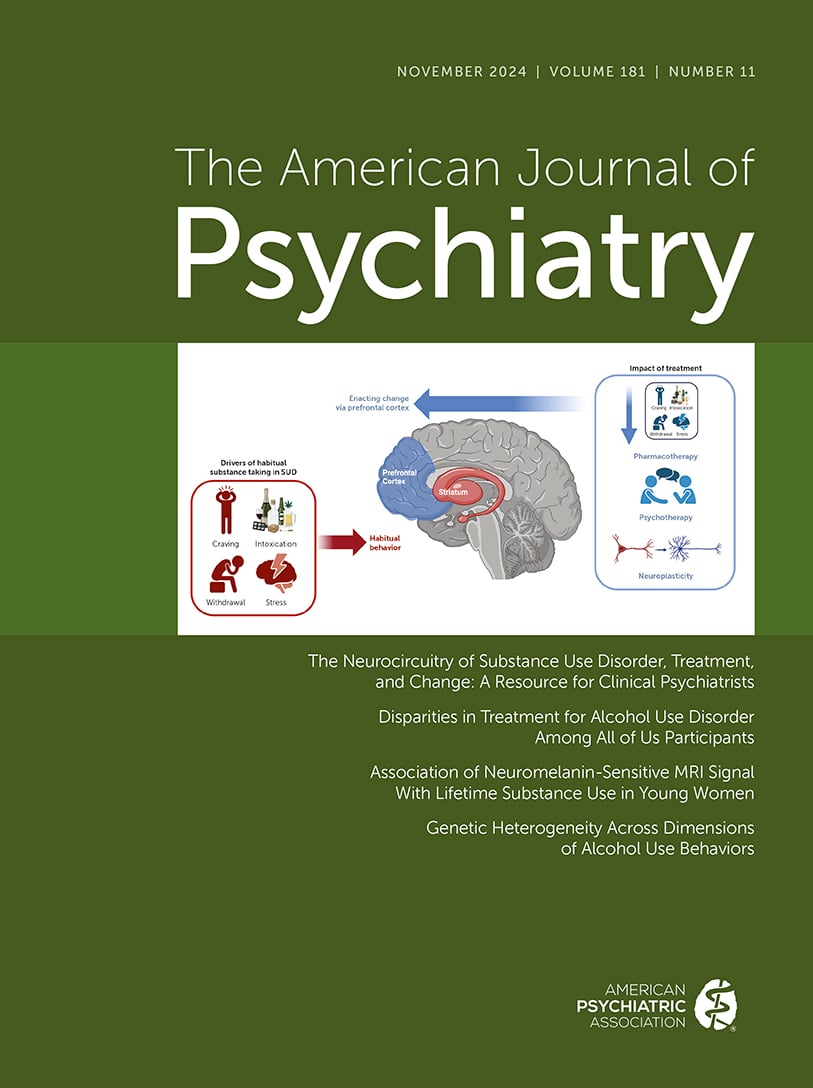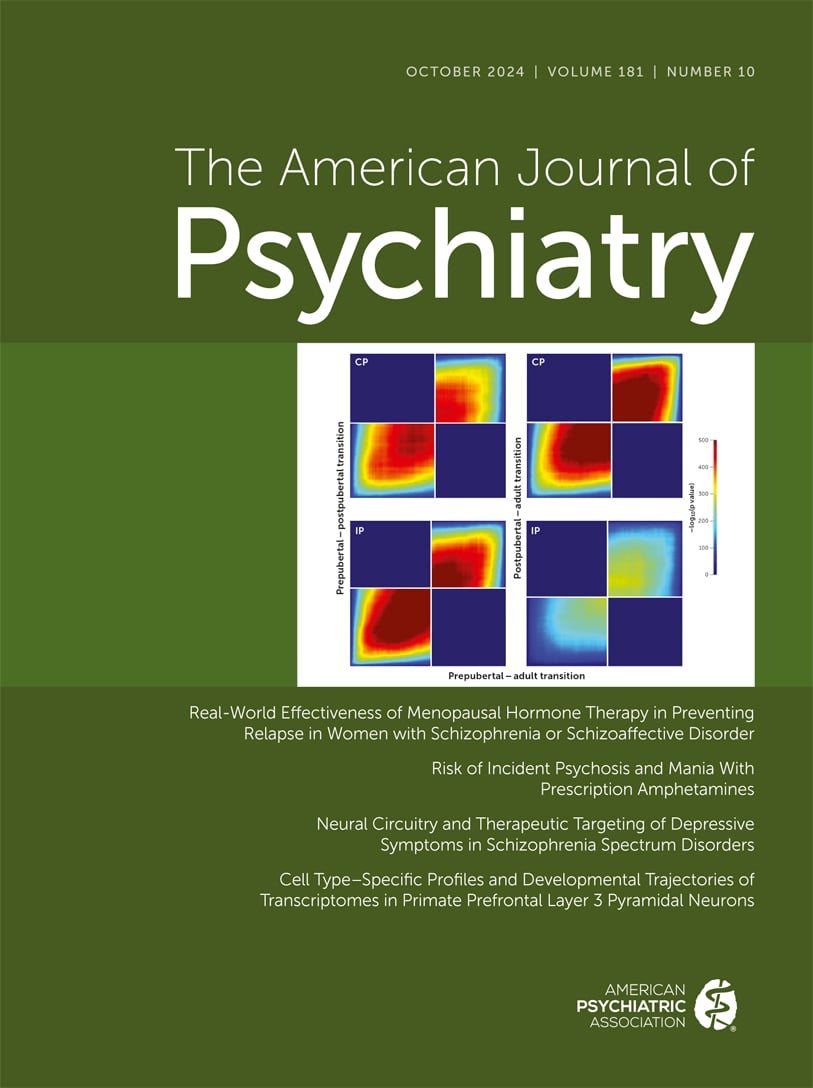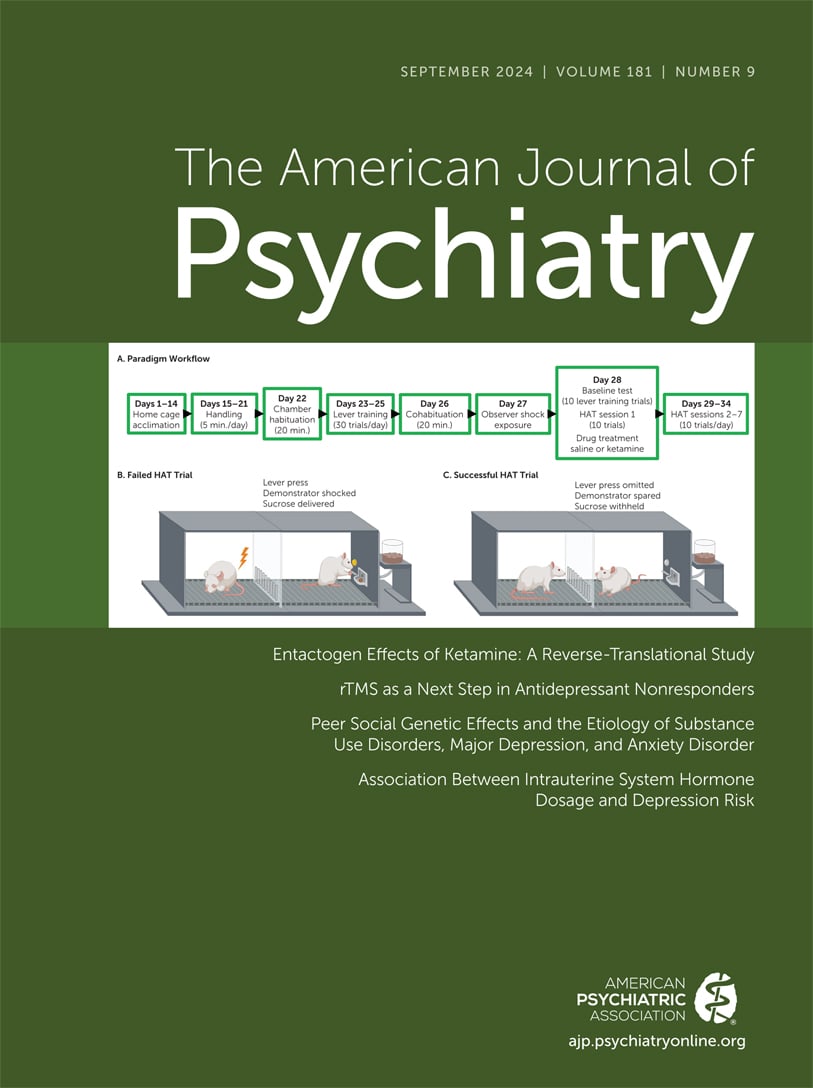American Journal of Psychiatry
- Volume 161
- Number 10
- October 2004
In This Issue
Editorial
Reviews and Overviews
Publication date: 01 October 2004
Pages1743–1754OBJECTIVE: Researchers have advocated replacing the DSM-IV classification of personality disorders with an alternative diagnostic system based on the five-factor model. This study evaluates the clinical comprehensiveness of the five-factor model and ...
https://doi.org/10.1176/ajp.161.10.1743Publication date: 01 October 2004
Pages1755–1763The address of the retiring president of the American Psychiatric Association has been a traditional part of the annual meeting of the association since 1883. The presidential address, which has explicitly been exempted from general discussion or ...
https://doi.org/10.1176/ajp.161.10.1755Images in Neuroscience
Introspections
Images in Psychiatry
Presidential Paper
Article
Publication date: 01 October 2004
Pages1776–1782OBJECTIVE: A family history of alcoholism is a risk factor for the development of ethanol dependence. Ethanol is an antagonist of the N-methyl-d-aspartate (NMDA) glutamate receptor, and alterations in NMDA receptor function are thought to be involved in ...
https://doi.org/10.1176/ajp.161.10.1776Publication date: 01 October 2004
Pages1783–1789OBJECTIVE: Alcohol and other drugs of abuse stimulate dopamine release in the ventral striatum, which includes the nucleus accumbens, a core region of the brain reward system, and reinforce substance intake. Chronic alcohol intake is associated with down-...
https://doi.org/10.1176/ajp.161.10.1783Publication date: 01 October 2004
Pages1790–1797OBJECTIVE: This study examined the extent and characteristics of alcohol dependence and the perceived need for and use of alcohol treatment services among women compared with men in a nonclinical sample of adults 18–64 years of age. METHOD: Data were ...
https://doi.org/10.1176/ajp.161.10.1790Publication date: 01 October 2004
Pages1798–1805OBJECTIVE: Deficits in working memory and in prefrontal cortical physiology are important outcome measures in schizophrenia, and both have been associated with dopamine dysregulation and with a functional polymorphism (Val108/158Met) in the catechol O-...
https://doi.org/10.1176/ajp.161.10.1798Publication date: 01 October 2004
Pages1806–1813OBJECTIVE: In a previous study, the authors reported that patients with schizophrenia show subcortical-limbic hypoactivity during sadness. In this study, they capitalized on those findings in order to assess the genetic influence of negative mood ...
https://doi.org/10.1176/ajp.161.10.1806Publication date: 01 October 2004
Pages1814–1821OBJECTIVE: The few studies of bipolar I disorder in twins have consistently emphasized the genetic contribution to disease liability. The authors report what appears to be the first twin study of bipolar I disorder involving a population-based twin sample,...
https://doi.org/10.1176/ajp.161.10.1814Publication date: 01 October 2004
Pages1822–1828OBJECTIVE: Sensory gating deficits found in schizophrenia can be assessed by using a paired auditory stimulus paradigm to measure auditory evoked response. The ratio of the P50 response amplitude of the second or test stimulus to that of the first or ...
https://doi.org/10.1176/ajp.161.10.1822Publication date: 01 October 2004
Pages1829–1836OBJECTIVE: A follow-up study of patients with schizophrenia was conducted to examine change in striatal volumes and extrapyramidal symptoms after a change in medication. METHOD: Thirty-seven patients with schizophrenia and 23 healthy volunteers were ...
https://doi.org/10.1176/ajp.161.10.1829Publication date: 01 October 2004
Pages1837–1847OBJECTIVE: Limited randomized, controlled trial data exist on possible differences between atypical antipsychotics in efficacy, overall tolerability, and important indices of health status. The authors compared the efficacy and tolerability of ziprasidone ...
https://doi.org/10.1176/ajp.161.10.1837Publication date: 01 October 2004
Pages1848–1855OBJECTIVE: Aberrant synaptic connectivity may underlie the involvement of the hippocampus in schizophrenia. There is reasonable neuropathological evidence for a presynaptic pathology but few studies of the postsynaptic component. This study tested the ...
https://doi.org/10.1176/ajp.161.10.1848Publication date: 01 October 2004
Pages1856–1863OBJECTIVE: Sleep disturbances characterize depression and may reflect the abnormal persistence of brain activity from wakefulness into non-REM sleep. The goal of this study was to investigate the functional neuroanatomical correlates of non-REM sleep ...
https://doi.org/10.1176/ajp.161.10.1856Publication date: 01 October 2004
Pages1864–1871OBJECTIVE: Minor depressive disorder is both common and associated with significant psychosocial impairment. This study examined antidepressant treatment efficacy in a large group of patients with minor depressive disorder. METHOD: One hundred sixty-two ...
https://doi.org/10.1176/ajp.161.10.1864Publication date: 01 October 2004
Pages1872–1876OBJECTIVE: A paucity of studies use nonpharmacological strategies for preventing recurrence in depression. Cognitive behavior treatment of residual symptoms was found to yield a significantly lower relapse rate than clinical management in recurrent ...
https://doi.org/10.1176/ajp.161.10.1872Publication date: 01 October 2004
Pages1877–1884OBJECTIVE: To investigate how residual symptoms from an index episode of major depressive disorder may be associated with recurrence, the authors conducted a trial involving four maintenance treatment approaches and examined 1) whether the level and ...
https://doi.org/10.1176/ajp.161.10.1877Publication date: 01 October 2004
Pages1885–1891OBJECTIVE: Although major depression is thought to have substantial negative effects on work performance, the possibility of recall bias limits self-report studies of these effects. The authors used the experience sampling method to address this problem ...
https://doi.org/10.1176/ajp.161.10.1885Publication date: 01 October 2004
Pages1892–1901OBJECTIVE: The authors’ goal was to assess the adequacy of control, quality of life, and treatment experiences of patients with chronic, recurrent depression being treated by primary care physicians. METHOD: The sample comprised 1,001 patients 18 years ...
https://doi.org/10.1176/ajp.161.10.1892Publication date: 01 October 2004
Pages1902–1908OBJECTIVE: This study compared demographic and phenomenological variables between bipolar patients with and without rapid cycling as a function of bipolar I versus bipolar II status. METHOD: The authors examined demographic, historical, and symptomatic ...
https://doi.org/10.1176/ajp.161.10.1902Brief Report
Publication date: 01 October 2004
Pages1909–1911OBJECTIVE: This study determined if actors could portray depressed patients to establish the interrater reliability of raters using the Hamilton Depression Rating Scale (HDRS). METHOD: Actors portrayed depressed patients using scripts derived from HDRS ...
https://doi.org/10.1176/ajp.161.10.1909Publication date: 01 October 2004
Pages1911–1913OBJECTIVE: Some have suggested that standardized rating scales be used in clinical practice to monitor the course of treatment; however, the time demands of clinical practice make it difficult to use such measures. This study derived a cutoff on a self-...
https://doi.org/10.1176/ajp.161.10.1911Publication date: 01 October 2004
Pages1913–1916OBJECTIVE: The authors compared patients who underwent stereotactic subcaudate tractotomy for depression, who were still depressed or recovered from depression, to identify therapeutic mechanisms. METHOD: Ten depressed and eight recovered psychosurgery ...
https://doi.org/10.1176/ajp.161.10.1913Publication date: 01 October 2004
Pages1916–1918OBJECTIVE: Bulimia nervosa has been associated with alterations in central serotonergic (5-HT) function. This study investigated iodine-labeled 4-amino-N-[1-[3-(4-fluorophenoxy) propyl]-4-methyl-4-piperidinyl]-5-iodo-2-methoxybenzamide (123I-5-I-R91150) ...
https://doi.org/10.1176/ajp.161.10.1916Publication date: 01 October 2004
Pages1918–1921OBJECTIVE: The authors investigated the structural brain correlates of antisaccade performance. METHOD: Magnetic resonance imaging was used to measure the volumes of the prefrontal, premotor, sensorimotor, and occipitoparietal cortices as well as the ...
https://doi.org/10.1176/ajp.161.10.1918Publication date: 01 October 2004
Pages1922–1924OBJECTIVE: The authors hypothesized that changes in brain membrane composition resulting from omega-3 fatty acid administration in patients with bipolar disorder would result in greater membrane fluidity, as detected by reductions in T2 values. METHOD: ...
https://doi.org/10.1176/ajp.161.10.1922Letter to the Editor
Book Forum: Substantial Professional Issues
Book Forum: Nature Versus Nurture
Book Forum: Ethics and Forensics
Book Forum: Mind, Brain, and Imagination
Correction
APA Official Actions
Past Issues
View Issues Archive
Vol. 181 | No. 12

Vol. 181 | No. 11

Vol. 181 | No. 10
